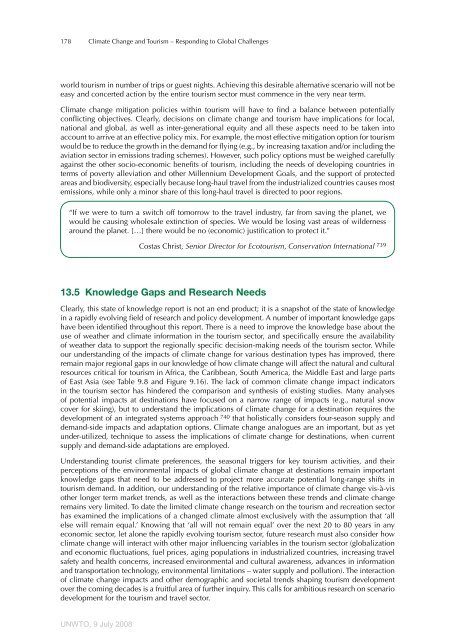Climate Change and Tourism - UNEP - Division of Technology ...
Climate Change and Tourism - UNEP - Division of Technology ...
Climate Change and Tourism - UNEP - Division of Technology ...
Create successful ePaper yourself
Turn your PDF publications into a flip-book with our unique Google optimized e-Paper software.
178 <strong>Climate</strong> <strong>Change</strong> <strong>and</strong> <strong>Tourism</strong> – Responding to Global Challenges<br />
world tourism in number <strong>of</strong> trips or guest nights. Achieving this desirable alternative scenario will not be<br />
easy <strong>and</strong> concerted action by the entire tourism sector must commence in the very near term.<br />
<strong>Climate</strong> change mitigation policies within tourism will have to find a balance between potentially<br />
conflicting objectives. Clearly, decisions on climate change <strong>and</strong> tourism have implications for local,<br />
national <strong>and</strong> global, as well as inter-generational equity <strong>and</strong> all these aspects need to be taken into<br />
account to arrive at an effective policy mix. For example, the most effective mitigation option for tourism<br />
would be to reduce the growth in the dem<strong>and</strong> for flying (e.g., by increasing taxation <strong>and</strong>/or including the<br />
aviation sector in emissions trading schemes). However, such policy options must be weighed carefully<br />
against the other socio-economic benefits <strong>of</strong> tourism, including the needs <strong>of</strong> developing countries in<br />
terms <strong>of</strong> poverty alleviation <strong>and</strong> other Millennium Development Goals, <strong>and</strong> the support <strong>of</strong> protected<br />
areas <strong>and</strong> biodiversity, especially because long-haul travel from the industrialized countries causes most<br />
emissions, while only a minor share <strong>of</strong> this long-haul travel is directed to poor regions.<br />
“If we were to turn a switch <strong>of</strong>f tomorrow to the travel industry, far from saving the planet, we<br />
would be causing wholesale extinction <strong>of</strong> species. We would be losing vast areas <strong>of</strong> wilderness<br />
around the planet. […] there would be no (economic) justification to protect it.”<br />
UNWTO, 9 July 2008<br />
Costas Christ, Senior Director for Ecotourism, Conservation International 739<br />
13.5 Knowledge Gaps <strong>and</strong> Research Needs<br />
Clearly, this state <strong>of</strong> knowledge report is not an end product; it is a snapshot <strong>of</strong> the state <strong>of</strong> knowledge<br />
in a rapidly evolving field <strong>of</strong> research <strong>and</strong> policy development. A number <strong>of</strong> important knowledge gaps<br />
have been identified throughout this report. There is a need to improve the knowledge base about the<br />
use <strong>of</strong> weather <strong>and</strong> climate information in the tourism sector, <strong>and</strong> specifically ensure the availability<br />
<strong>of</strong> weather data to support the regionally specific decision-making needs <strong>of</strong> the tourism sector. While<br />
our underst<strong>and</strong>ing <strong>of</strong> the impacts <strong>of</strong> climate change for various destination types has improved, there<br />
remain major regional gaps in our knowledge <strong>of</strong> how climate change will affect the natural <strong>and</strong> cultural<br />
resources critical for tourism in Africa, the Caribbean, South America, the Middle East <strong>and</strong> large parts<br />
<strong>of</strong> East Asia (see Table 9.8 <strong>and</strong> Figure 9.16). The lack <strong>of</strong> common climate change impact indicators<br />
in the tourism sector has hindered the comparison <strong>and</strong> synthesis <strong>of</strong> existing studies. Many analyses<br />
<strong>of</strong> potential impacts at destinations have focused on a narrow range <strong>of</strong> impacts (e.g., natural snow<br />
cover for skiing), but to underst<strong>and</strong> the implications <strong>of</strong> climate change for a destination requires the<br />
development <strong>of</strong> an integrated systems approach 740 that holistically considers four-season supply <strong>and</strong><br />
dem<strong>and</strong>-side impacts <strong>and</strong> adaptation options. <strong>Climate</strong> change analogues are an important, but as yet<br />
under-utilized, technique to assess the implications <strong>of</strong> climate change for destinations, when current<br />
supply <strong>and</strong> dem<strong>and</strong>-side adaptations are employed.<br />
Underst<strong>and</strong>ing tourist climate preferences, the seasonal triggers for key tourism activities, <strong>and</strong> their<br />
perceptions <strong>of</strong> the environmental impacts <strong>of</strong> global climate change at destinations remain important<br />
knowledge gaps that need to be addressed to project more accurate potential long-range shifts in<br />
tourism dem<strong>and</strong>. In addition, our underst<strong>and</strong>ing <strong>of</strong> the relative importance <strong>of</strong> climate change vis-à-vis<br />
other longer term market trends, as well as the interactions between these trends <strong>and</strong> climate change<br />
remains very limited. To date the limited climate change research on the tourism <strong>and</strong> recreation sector<br />
has examined the implications <strong>of</strong> a changed climate almost exclusively with the assumption that ‘all<br />
else will remain equal.’ Knowing that ‘all will not remain equal’ over the next 20 to 80 years in any<br />
economic sector, let alone the rapidly evolving tourism sector, future research must also consider how<br />
climate change will interact with other major influencing variables in the tourism sector (globalization<br />
<strong>and</strong> economic fluctuations, fuel prices, aging populations in industrialized countries, increasing travel<br />
safety <strong>and</strong> health concerns, increased environmental <strong>and</strong> cultural awareness, advances in information<br />
<strong>and</strong> transportation technology, environmental limitations – water supply <strong>and</strong> pollution). The interaction<br />
<strong>of</strong> climate change impacts <strong>and</strong> other demographic <strong>and</strong> societal trends shaping tourism development<br />
over the coming decades is a fruitful area <strong>of</strong> further inquiry. This calls for ambitious research on scenario<br />
development for the tourism <strong>and</strong> travel sector.

















